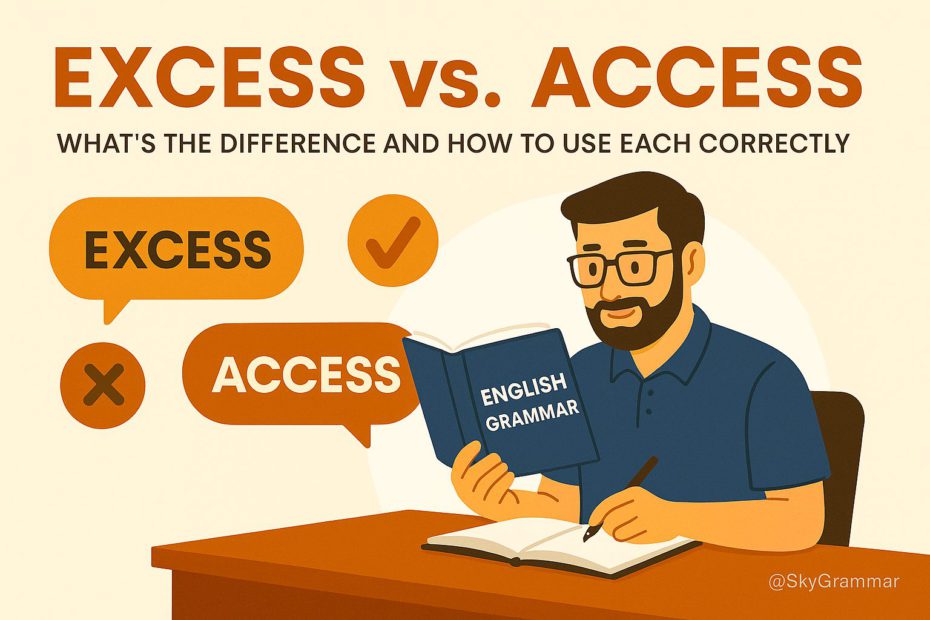English is filled with words that look or sound similar but have entirely different meanings. Among the common pairs that cause confusion are “excess” and “access.” While they may sound somewhat alike, they have distinct definitions, uses, and parts of speech. This blog post will help you understand the difference between excess and access, how to use them correctly, and how to avoid common mistakes.
Let’s dive into the definitions, examples, and grammatical uses of these two words.
What Is “Excess”?
The word excess (pronounced /ˈɛk.sɛs/) typically refers to an amount that is more than necessary, usual, or allowed. This word can serve as a noun or adjective, and in some formal contexts, it may also be used as a verb.
🔹 As a Noun
When used as a noun, excess describes the state of having too much of something.
Examples:
- An excess of sugar in your diet can lead to health problems.
- He was fined for driving with excess speed.
- The trunk is filled with excess baggage we don’t really need.
🔹 As an Adjective
As an adjective, excess modifies a noun by indicating that it is more than what is necessary.
Examples:
- She donated her excess clothes to charity.
- The excess water from the flood caused serious damage.
- After the event, we had to throw away the excess food.
What Is “Access”?
The word access (pronounced /ˈæk.sɛs/) refers to the ability or right to enter, use, or approach something. It can also be used both as a noun and a verb.
🔹 As a Noun
As a noun, access means the opportunity or means to approach or enter a place or use something.
Examples:
- Are you able to access the building after hours?
- Students now have access to online study materials.
- Internet access is limited in remote villages.
🔹 As a Verb
When used as a verb, access means to enter or retrieve something, especially in terms of technology or data.
Examples:
- You can access your email from any device.
- The technician couldn’t access the server due to a firewall issue.
- To complete the assignment, students must access the digital library.
Key Differences Between “Excess” and “Access”
Let’s break down the main differences in a simple table for easy reference:
| Feature | Excess | Access |
|---|---|---|
| Meaning | Too much of something | The ability to enter or use something |
| Function | Noun, Adjective | Noun, Verb |
| Pronunciation | /ˈɛk.sɛs/ | /ˈæk.sɛs/ |
| Example (Noun) | Excess sugar is bad for your health. | He has access to the company database. |
| Example (Verb) | (Rare as verb) | You can access the file online. |
How to Avoid Confusing “Excess” and “Access”
Because both words have a similar sound and are spelled closely, it’s easy to misuse them in speech or writing. Here are a few tips to avoid confusion:
✅ Tip 1: Think About the Context
Ask yourself: Are you referring to too much of something (excess) or the ability to use or enter (access)?
Wrong: She has excess to the library.
Right: She has access to the library.
Wrong: He drank an access amount of coffee.
Right: He drank an excess amount of coffee.
✅ Tip 2: Check the Part of Speech
If you’re using the word as a verb, you’re almost certainly looking for access.
Correct Usage (Verb):
- You can access the report via the app.
Incorrect Usage:
- You can excess the report via the app. ❌ (Wrong and not standard English)
✅ Tip 3: Use Mnemonics
To remember the difference, try this trick:
- Access = Approach (Both begin with “A”)
- Excess = Extra (Both begin with “Ex”)
Common Phrases with “Excess”
- Excess baggage – More luggage than the allowed limit
- Excessive force – Using more force than necessary
- In excess of – More than (a specific amount)
Examples:
- The police were accused of using excessive force.
- She was charged for excess baggage at the airport.
- The fine was in excess of $500.
Common Phrases with “Access”
- Access denied – A common phrase in technology indicating you are not allowed to enter or view something.
- Gain access – To gain the right or means to enter, use, or approach something.
- Restricted access – Limited or controlled entry
Examples:
- I couldn’t log in; it said “access denied.”
- The library offers free access to academic journals and research papers.
- This file is under restricted access.
Test Your Understanding
Here are a few fill-in-the-blank sentences. Can you choose the right word?
- Using the app, you can __ your files from anywhere.
- He was fined for driving at an ______ speed.
- Due to the snowstorm, we couldn’t ______ the building.
- She bought an ______ of ingredients and ended up wasting them.
- All employees should have ______ to the emergency exit.
Answers:
- access
- excess
- access
- excess
- access
Final Thoughts
While “excess” and “access” might look or sound similar, their meanings are completely different. Remember:
- ✅ Use “excess” when you’re talking about an amount that is more than necessary or desirable.
- ✅ Use “access” when referring to the ability to enter, reach, or use something.
By understanding the definitions, parts of speech, and usage of each term, you can avoid common mistakes and write more clearly and accurately.
📚 Pro Tip: If you’re ever unsure, look at the sentence as a whole and ask yourself whether you’re talking about quantity (excess) or entry/availability (access).

